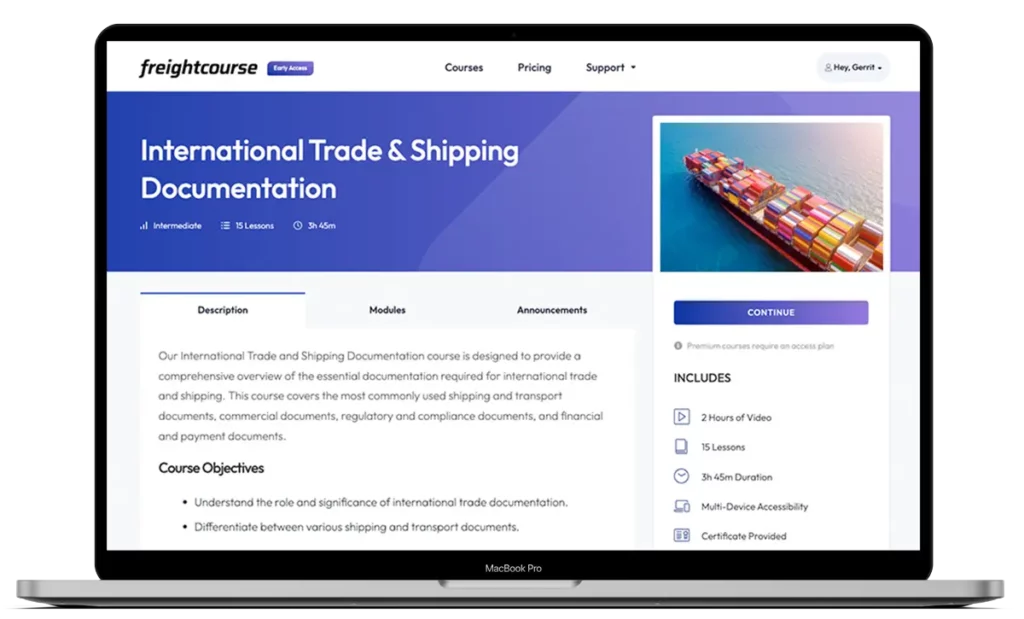NVOCCs and VOCCs are oftentimes mistaken to be the same. If you are part of a supply chain, procurement, logistics, trading or shipping department, you’ve most likely heard of these terms before.
An NVOCC is a non-vessel operating common carrier and a VOCC is a vessel operating common carrier. The difference between NVOCCs and VOCCs is that VOCCs are carriers (shipping lines) that own and operate vessels, whereas NVOCCs are carriers (freight forwarders) that don’t own or operate any vessels.
However, there are also several other distinctions between both types of ocean carriers. This article will try to explain how similar and different NVOCCs and VOCCs are. In addition, we’ll also discuss their service offerings and scope, as well as the reasons for choosing one over the other.
What is a Non-Vessel Operating Common Carrier (NVOCC)?
An NVOCC is a non-vessel operating common carrier and describes a company (typically freight forwarders) who don’t own or operate any vessels. They are tasked to provide ocean transport services using its own contract of carriage (House Bill of Lading), without operating any vessels.
It can also offer other logistics services to generate revenue. Here is a shortlist of the traditional offerings of an NVOCC:
- Trucking – inland transportation for containerized and non-containerized cargo.
- Customs clearance (import and export) – service in the clearing of cargo for export and export shipments
- Freight forwarding – service from an origin port to a destination port
- Documentation management – handle end-to-end documentation
Let’s define the shipping service an NVOCC typically do:
| Shipping Service | Example |
| Port-to-Door | Port of Los Angeles to importers destination address |
| Port-to-Port | Port of Tokyo to Port of Los Angeles |
| Door-to-Port | Shippers door to Port of Tokyo |
| Door-to-Door | Shippers door to Consignees door |
NVOCCs have a working relationship with many carriers. It presents its clients flexibility in terms of sailing schedule, transit time, and gives competitive pricing to various ports or designated delivery areas of the consignee around the world.
Once shipments have been loaded on the intended vessel the NVOCC will issue a House Bill of Lading (HBL). An HBL is a legally binding document, proof of ownership, and a contract of carriage.
Another important aspect is that NVOCCs should understand are the INCOTERMS. NVOCC often encounter these trade terms, as they typically handle all types of shipping arrangements (door-to-door, port-to-port and more).
An NVOCC is not necessarily represented by its own offices internationally. A representation can be in the form of agency associations (with formal agency agreements covering service and payment terms). The bigger NVOCCs usually have their organizational setup in different countries they operate in and customized systems for easy communication.
It is no secret that NVOCCs may take a jack-of-all-trades approach. It offers flexibility because of a wide network of industry-specific requirements. NVOCCs work with various government authorities and offer their services by giving the customer detailed information on needed permits and estimated computation for duties and taxes per commodity.
Depending on the number of containers or shipments an NVOCC must also have an extensive list of vendors in order to provide an end-to-end shipping solution to its customers. It’s the work of the NVOCC to take note of the various changes to sailing schedules and corresponding rates.
For shipments to the United States, an NVOCC may sign service contracts with the carriers using wholesale rates and guaranteed space commitment.
Let us also not forget that less-than-container load (LCL) business can be a complex undertaking. Not all exporters or importers can fill a container. The NVOCC will sell the space on a per CBM basis to its customers.
NVOCC Companies
There are plenty of NVOCCs around the world, some having more of a local presence, while larger players have more of a regional or global presence. Here are some of the largest NVOCCs:
- DB Schenker Logistics
- DHL Supply Chain & Global Forwarding
- Expeditors International
- Kuehne+Nagel
- DSV
- Nippon Express
- Bollore Group
- UPS Supply Chain Services
- Kintetsu World Express
What is a Vessel Operating Common Carrier (VOCC)
On the other hand, a VOCC is a vessel-operating common carrier, which is also known as a shipping line, ocean carrier or steamship line, who own and operate their own vessels.
They typically own the shipping containers and sell port-to-port services to their customers. All shipments booked with VOCCs are issued the Master Bill of Lading.
Although VOCCs primarily focus on offering port-to-port services, they occasionally have partnerships with the rail companies for inland ports. These inland ports or destinations are landlocked and can only be reachable by train.
In the United States, shipments are unloaded from the west coast or east coast. To get to the land-locked destinations the shipping lines work with rail companies using double-stack rail transport.
Though carriers generally value relationships with the NVOCCs they commonly interact with shippers directly. They submit their own bids and do the negotiations limiting forwarders to service customs clearance and trucking.
Working with carriers directly also has some advantages. Carriers can also offer more time for detention and demurrage, prioritize vessel space for priority cargo, control shipping equipment, network routing and extended cutoff times for exports.
Shipping lines have leverage in the rates and are in no obligation to keep freight rates given to the forwarder for a long time. Rates can sometimes change on a month-to-month basis which cargo owners may frown upon.
Depending on the number of carriers a customer works with, it is limited to the sailing schedule the shipping line can offer. Not all carriers have direct service. There is what you call a transshipment port where containers are unloaded from the feeder vessel to the mother vessel.
Customers who cannot fill a container, would need to book their service with an NVOCC or consolidator, as VOCCs generally do not offer LCL service.
VOCC Companies
Vessel-operating common carriers have been around for a long time and have recently formed alliances. Here are some notable VOCCs.
- Maersk
- MSC
- Cosco
- CMA-CGM
- Hapag-Lloyd
- ONE
- Evergreen Line
- Hyundai Merchant Marine
- Yang Ming Marine Transport
- Zim Lines
Similarities and Differences between NVOCCs and VOCCs
It’s important to understand the similarities and difference between NVOCCs (freight forwarders) and VOCCs (shipping lines), in order to understand which one is more suitable for a particular shipment.
We can liken NVOCC to travel agents – booking airlines, hotels, and passenger services while VOCC are the actual airline companies who own and operate the aircraft.
In summary, here are some of the key similarities and difference that you should take note of:
| NVOCC | VOCC | |
| Contract of Carriage | House Bill of Lading | Master bill of lading |
| Full Container Load Service | Yes | Yes |
| Loose Cargo Load Service | Yes | No |
| Door to Door Service | Yes | Limited |
| Representation | Worldwide, depending on size or agency network | Worldwide depending on ports of service |
| Rates | Market driven | Market driven |
| Sailings | Selection of multiple carriers | Based on own schedule |
| Key Differentiators | End-to-end service, multiple, vendors, flexible arrangements | Controls space and equipment, sailing schedule, aggressive pricing |
When Should You Use NVOCCs and VOCCs?
This question is best answered from the customer’s point of view, as they have different types of shipping arrangements, depending on the nature of the shipment.
There are no hard and fast rules when picking between NVOCCs or VOCCs. It depends on when the time shipment booking is sent or received, the situation of the market, the rates, equipment and space situation and the service that is required.
Larger customers typically opt to work directly with shipping lines, as they have the volume to support this. A freight forwarder is usually more flexible with a broader service offer and excels at handling smaller, but also larger customers.
As NVOCCs book space and equipment directly with VOCCs, it can often mean that their costs may be higher than when booking with a shipping line directly. However, they are able to offer value in terms of customer support, documentation handling and much more.
Most of the time choosing one over the other is down to who can offer the best service in terms of volume, container equipment, space, transit times and service type. Therefore, it’s recommended to approach both NVOCCs and VOCCs if the nature of your shipment is port-to-port, but mainly NVOCCs if you require door-to-port or, port-to-door or door-to-door services
Choose an NVOCCs if you:
- Have shipments to or from door
- Need flexible sailings
- Require end-to-end services
- Seek closer customer support
Choose an NVOCCs if you:
- Are cost sensitive
- Have large volumes
- Require special D&D rates
- Require port-to-port services

Get Free Course Access
If you enjoyed the article, don’t miss out on our free supply chain courses that help you stay ahead in your industry.

Gerrit Poel
Co-Founder & Writer
at freightcourse
About the Author
Gerrit is a certified international supply chain management professional with 16 years of industry experience, having worked for one of the largest global freight forwarders.
As the co-founder of freightcourse, he’s committed to his passion for serving as a source of education and information on various supply chain topics.
Follow us